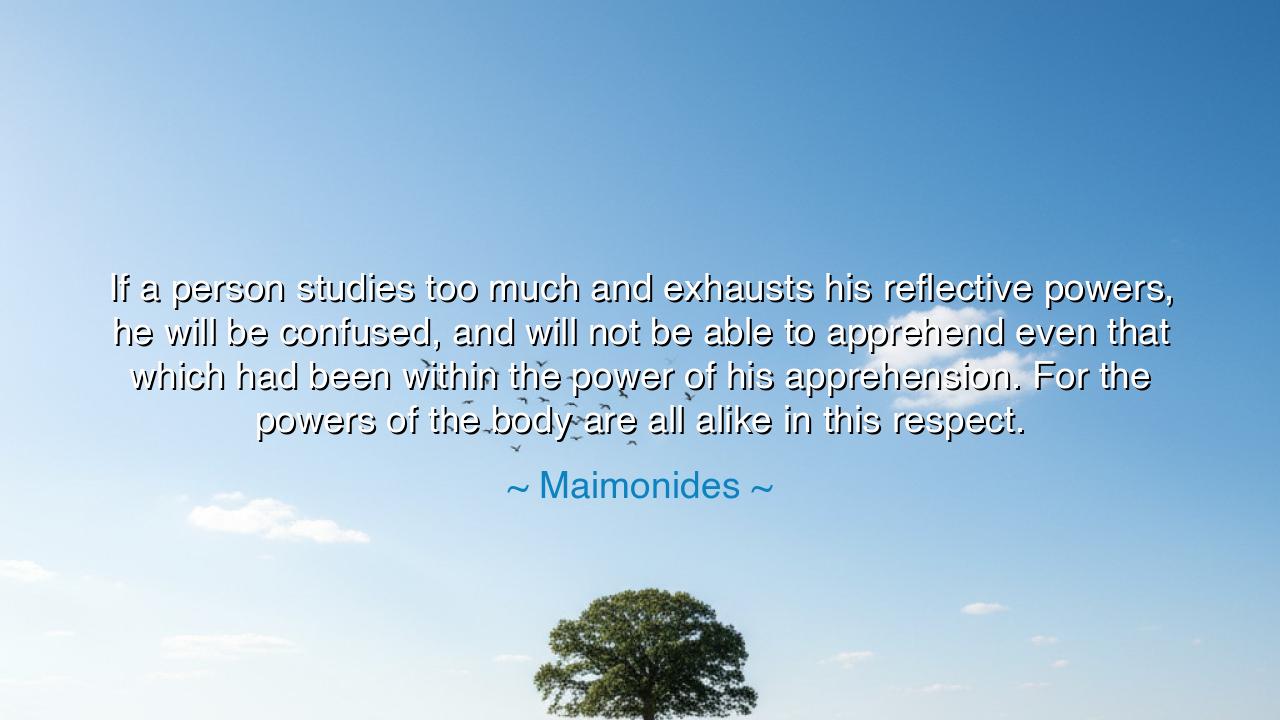
If a person studies too much and exhausts his reflective powers
If a person studies too much and exhausts his reflective powers, he will be confused, and will not be able to apprehend even that which had been within the power of his apprehension. For the powers of the body are all alike in this respect.






Hear, O seekers of wisdom, the words of Maimonides, the great philosopher and physician of the Middle Ages: “If a person studies too much and exhausts his reflective powers, he will be confused, and will not be able to apprehend even that which had been within the power of his apprehension. For the powers of the body are all alike in this respect.” These words, though clothed in simplicity, are profound, for they remind us that both body and mind are bound by limits, and that even the noblest pursuit, if pressed without balance, can turn against the one who seeks it.
The origin of this teaching lies in Maimonides’ dual life as healer of bodies and guide of souls. He lived in an age when learning was revered, when scholars devoured texts with hunger as fierce as warriors wielding swords. Yet, as physician, he saw with his own eyes how the body breaks when pushed beyond its strength, and as philosopher, he knew the mind follows the same law. Thus he warned that the powers of reflection are not infinite. When overstrained, they cloud rather than clarify, they confuse rather than enlighten. What once could have been grasped with ease becomes elusive when sought in excess.
Consider the metaphor of the athlete. If he lifts weights beyond his limit, not only does he fail to gain strength, he injures himself and loses what power he already had. So too with the scholar who studies without rest. The mind, like the muscle, requires rhythm: exertion and recovery, stretching and repose. To demand of it constant effort without respite is to turn wisdom into folly, clarity into fog. Thus Maimonides, master of both medicine and metaphysics, declared that the powers of the body are all alike—each must be cared for, balanced, and guarded against exhaustion.
History offers us vivid examples of this truth. Recall the story of Sir Isaac Newton, who labored night and day in pursuit of knowledge. In his brilliance, he uncovered the laws of motion and gravity, yet in seasons of overwork he fell into breakdown and despair. His mind, overtaxed, turned against him until rest restored its balance. Likewise, the monks of many traditions, though devoted to prayer and study, established hours of labor, rest, and contemplation, knowing that the mind flourishes not in ceaseless toil but in harmony with the body’s needs.
There is a lesson here for all who strive after greatness. To study is noble, to seek knowledge is holy, but to mistake endless striving for wisdom is a path to ruin. The candle that burns too quickly gives a great flame for a moment, then vanishes into darkness. The wise soul tends the flame carefully, allowing it to endure and illuminate for long years. In this way, the student becomes not merely a seeker of truth, but a guardian of the very powers that make truth attainable.
Maimonides teaches also of moderation, that ancient virtue praised by Aristotle and the sages. He does not call us to idleness, nor to neglect, but to balance. For wisdom is not found in the extremes of sloth or of frenzy, but in the steady cultivation of mind and body together. The one who knows when to pause, when to walk, when to sleep, and when to reflect will in time achieve more than the one who burns his strength in restless haste.
Therefore, O listeners, let your practice be clear: study diligently, but not without measure. Take rest when your mind grows weary. Walk among trees, speak with friends, let your body breathe, and then return to your books with renewed vigor. In this rhythm lies the secret of endurance, the path to clarity, the way to true wisdom. For the powers of the body are all alike—they demand care, lest in seeking everything, you lose even what was already within your grasp.
Thus let Maimonides’ words endure as counsel across the ages: knowledge is not a race, but a pilgrimage. Pace yourself wisely, and the gates of understanding will open to you—not in confusion, but in radiant clarity.






AAdministratorAdministrator
Welcome, honored guests. Please leave a comment, we will respond soon